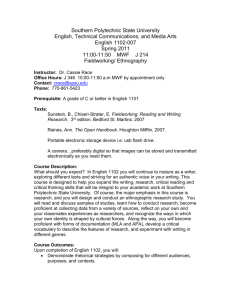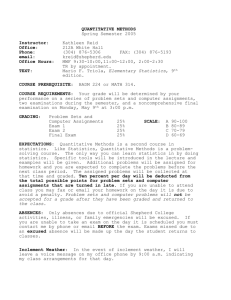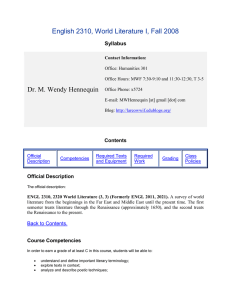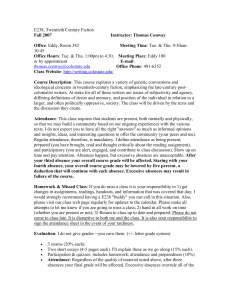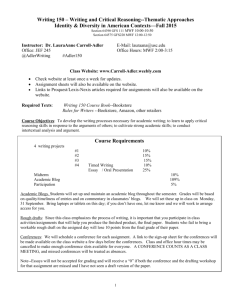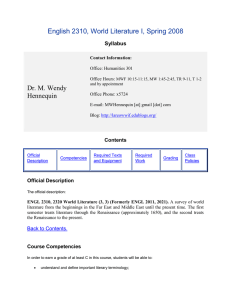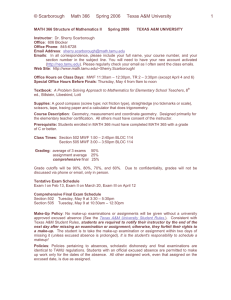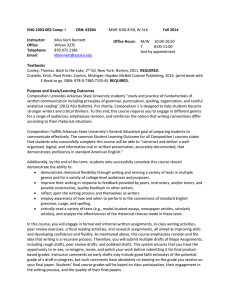Spring - Tennessee State University
advertisement
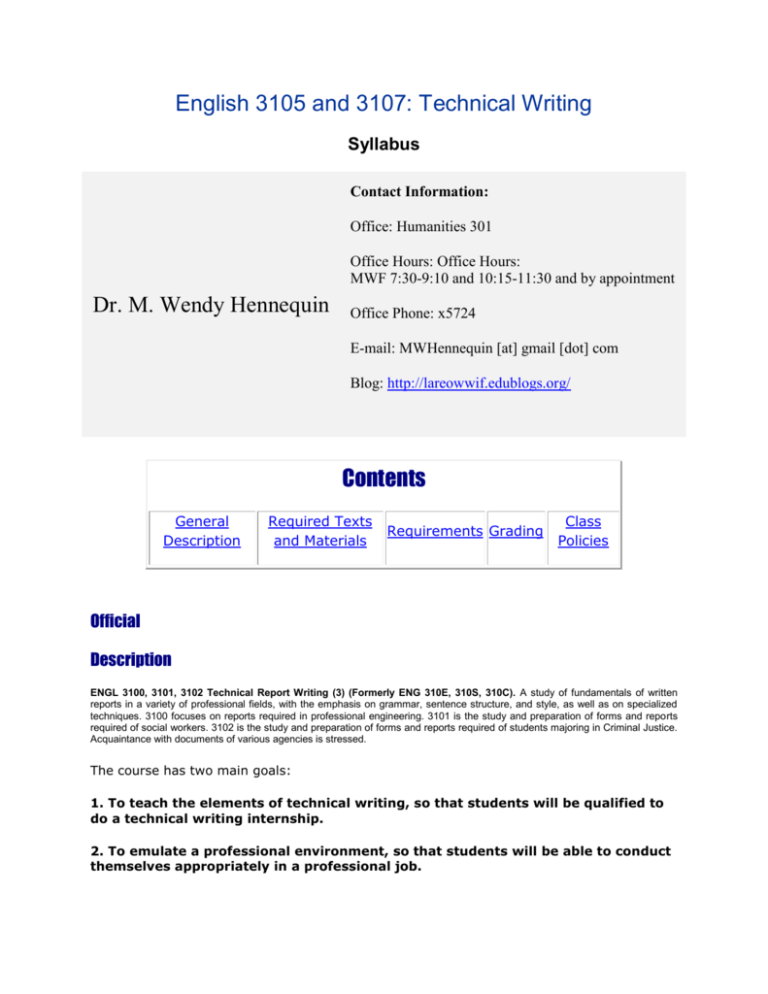
English 3105 and 3107: Technical Writing Syllabus Contact Information: Office: Humanities 301 Office Hours: Office Hours: MWF 7:30-9:10 and 10:15-11:30 and by appointment Dr. M. Wendy Hennequin Office Phone: x5724 E-mail: MWHennequin [at] gmail [dot] com Blog: http://lareowwif.edublogs.org/ Contents General Description Required Texts and Materials Requirements Grading Class Policies Official Description ENGL 3100, 3101, 3102 Technical Report Writing (3) (Formerly ENG 310E, 310S, 310C). A study of fundamentals of written reports in a variety of professional fields, with the emphasis on grammar, sentence structure, and style, as well as on specialized techniques. 3100 focuses on reports required in professional engineering. 3101 is the study and preparation of forms and reports required of social workers. 3102 is the study and preparation of forms and reports required of students majoring in Criminal Justice. Acquaintance with documents of various agencies is stressed. The course has two main goals: 1. To teach the elements of technical writing, so that students will be qualified to do a technical writing internship. 2. To emulate a professional environment, so that students will be able to conduct themselves appropriately in a professional job. Back to Contents. Required Texts and Materials Anderson, Paul. Technical Communication. 6th ed. Boston: Thompson Wadsworth, 2007. ISBN: 1413027504. Some mechanism for transferring your computer files: e-mail, jump drive, CD-rom, diskette. Access to the World Wide Web. Back to Contents. Requirements and Competencies Requirements: have successfully completed English 1010 and 1020, or their equivalents. come to class. arrive on time. Students who do not arrive on time may be marked absent or may receive half or no credit for attendance / participation. participate in class discussions and activites. do all homework and assignments. turn in work on time. Late work receives a 0. collaborate with other students. complete all assignments. do high quality work, including participation work. act professionally. do original work. Plagiarism will result in a zero for the assignment and / or a failing grade for the course. Competencies: identify different types of technical documents and their elements. write clear, coherent technical documents that adhere to an appropriate purpose. use verbal and visual techniques, such as chunking, white space, headings, lists, graphics, etc., to promote usability, accessibility, and organization. design usable and accessible documents. create web pages and slide show presentations. Back to Contents. Grading Writing Grades Technical writing conveys information to a target audience clearly, concisely, quickly, and completely, for a certain purpose. Technical writing must also follow standard writing practices, such as correct grammar, syntax, spelling, and citation conventions. Technical writing papers will be graded, therefore, on focus, or adherence to the purpose, clarity, organization, conciseness, appropriateness for the target audience, use of technical writing techniques to meet these criteria, visual design, and correct grammar, spelling, syntax, and citation. More often than not, a poor grade reflects not a failure of ideas but poor writing quality. Don't despair. Writing well takes practice--sometimes years of practice. Participation Grades Your participation forms a significant part of your grade. Participation consists of: Attendance of class. Yes, I give you a point every day just for showing up. If you show up late, I may give you half a point or no points. Preparation for class activities, such as commenting on other students' drafts and working on in-class projects. Participation in classes. For each class in which you ask a relevant question or add something relevant to the discussion, you gain another point--on top of the one you gained for simply attending. Meeting with me in my office (or elsewhere) outside of class also earns points. Perfect Attendance. Students who attend every class will earn 5 points towards their class participation. Excessive Absenteeism. Students who miss more than one week's worth of classes (3 on MWF, 2 on TR, etc.) will fail class participation. Students missing more than 2 weeks worth of classes (6 on MWF, 2 on TR, etc.) will earn a 0 in class participation. Semester Grade Calculation Audience Assignment: 15% Proposal and Presentation: 20% Instructions: 20% Report: 20% In-class Writing: 10%. Participation: 15% There is no final exam, but the final assignment will be due during exam week. Make your travel plans accordingly. Back to Contents. Class Policies Attending University is a job, an internship which prepares students for their careers. I therefore expect my students to treat the class as a professional commitment, rather than a pastime or a hobby. My class policies emulate the expectations of professionals in the workplace. 1. Attendance is mandatory. o Excused absences. For the purposes of class participation, I will excuse absences only for the following circumstances and only with proper documentation. Death in the immediate family. “Immediate family” includes (step)parents, parental guardians, (step-)sons, (step-)daughters, (step)siblings, and spouses. Serious and extended illness or injury lasting a week or more (such as mononucleosis). University business (team travel, band travel, the Rising Junior exam but not practices, meetings with your advisor, or requirements for other classes). Court appearances required by sub poena or otherwise mandated by the court. Disability-related absences. Students missing more than one week's worth of classes (3 for a MWF class, 2 for a TR) will fail class participation. Students missing more than two weeks' worth of classes (6 for a MWF class, 4 for a TR) will earn a 0 for class participation. See page 29 of the Undergraduate Catalogue for official university policy. 2. Be on time. Tardiness is rude and disrupts the class. If you are tardy, I may give you a half point or no points for attendance and / or participation. 3. Disability. I will make reasonable accommodations for disabled students with documentation from Disabled Student Services. o Students must bring me the accommodation letter from Disabled Student Services by the second week of class. o Absences related to your disability must be documented individually and separately from the accommodation letter. 4. 5. 1. 2. Electronics: Do not send e-mail, text, or instant messages, or surf the Web, or use your cell phone, MP3 player / iPod, laptop, or Blackberry. After 1 warning, I will deduct FIVE POINTS off your FINAL GRADE. 3. Assignments are due at the beginning of class on the due dates. o I do not accept late work unless you have an extension. o If you need an extension, you must request it one class day in advance. o You do not have an extension unless I say you have one. o Each student is allowed one (1) 24-hour emergency extension to cover true emergencies such as computer melt-down, printer failure, or vehicular mishaps. Students must tell me that they are using the extension when the paper is due and must deliver the paper to my mailbox (in Humanities 104) within 24 hours. 4. Make-ups: Class work must be done in class. o In-class writing work, quizzes, discussions, etc. cannot be made up. Students who are excused for the day are excused for the work; all others who miss the class earn a zero for the assignment. o o I may allow a student with convincing documentation to make up a major test. The final exam must be taken during the exam period, and I cannot change the date of a student's exam. This is university policy. 5. Do your own work. The TSU Undergraduate Catalogue says this about academic fraud: 6. Plagiarism, cheating, and other forms of academic dishonesty are prohibited. Students guilty of academic misconduct, either directly or indirectly through participation or assistance, are immediately responsible to the instructor of the class. In addition to the other possible disciplinary sanctions which may be imposed through the regular institutional procedures as a result of academic misconduct, the instructor has the authority to assign an ‘F’ or a zero for the exercise or examination, or assign an ‘F’ in the course. (29) Students submitting any fraudulent work—copied, plagiarized, stolen, bought, cheated, etc.—will receive a ZERO for the assignment, and may receive an F for the course. An important clarification: collaboration is not plagiarism. A person who plagiarizes claims someone else's work for his or her own; people who collaborate on a project claim that they have done the work together and that the work they have done together is their own. You need not credit collaborating colleagues if they proofread, critique, or make suggestions on your work. 7. E-mail: Treat e-mail professionally. o I check my e-mail once daily on weekdays during the semester. o All e-mails must be: polite and professional. well-spelled and grammatically correct. brief. o You may e-mail me to: request an extension (at least one class period before the assignment is due). make an appointment with me. ask about thesis statements or paper topics. request recommendation letters. o I will not respond to e-mails regarding: grades or comments on your papers. (Come to my office to discuss these issues.) missed assignments or notes. (Ask your classmates and / or check the schedule.) technical support. (Call the technical support folks at extension 7777.) questions on assignments, material covered in class, grammar, or citation formats. (Ask in class, so that you get credit for it and everyone gets the answer.) complaints of any sort. o You may not hand in assignments via e-mail. Back to Contents.

